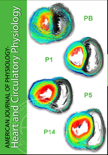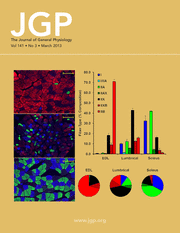
Acta Physiologica
Scope & Guideline
Pioneering Research for a Healthier Tomorrow
Introduction
Aims and Scopes
- Physiological Mechanisms and Pathophysiology:
The journal focuses on the underlying mechanisms of physiological processes in various organ systems, including cardiovascular, renal, and neural physiology, with an emphasis on how these mechanisms are altered in disease states. - Exercise Physiology:
A significant area of interest includes the physiological adaptations to exercise, exploring how different exercise modalities affect muscle function, metabolic health, and overall well-being. - Translational Research:
There is a strong emphasis on translational research that bridges the gap between laboratory findings and clinical applications, particularly concerning metabolic diseases, cardiovascular health, and neurodegenerative conditions. - Cellular and Molecular Physiology:
Research articles often delve into cellular and molecular mechanisms, including studies on ion channels, signaling pathways, and the role of various biomolecules in regulating physiological functions. - Comparative Physiology:
The journal also publishes comparative physiology studies that examine physiological adaptations across different species, providing insights into evolutionary biology and potential applications in biomedical research.
Trending and Emerging
- Microbiome and Gut-Brain Axis:
Research exploring the interactions between the gut microbiome and the brain has surged, highlighting the significance of microbial influences on metabolic health, neurological function, and overall well-being. - Mitochondrial Function and Metabolism:
Studies focusing on mitochondrial dynamics, bioenergetics, and their role in health and disease have become increasingly prominent, reflecting the growing understanding of mitochondrial dysfunction in various pathologies. - Exercise Immunology:
The intersection of exercise science and immunology is emerging as a key area of research, with studies investigating how physical activity influences immune responses and contributes to health outcomes. - Neurovascular Interactions:
Research on the relationship between neurovascular function and metabolic diseases is gaining attention, particularly in understanding how neural regulation affects vascular health and disease. - Circadian Rhythms and Metabolism:
The exploration of circadian rhythms and their impact on metabolism and physiological functions is trending, as researchers seek to understand how timing influences health and disease mechanisms.
Declining or Waning
- Traditional Pharmacology Studies:
There has been a noticeable decrease in studies focused solely on traditional pharmacological approaches without integrating modern techniques such as genomics or proteomics, indicating a shift towards more holistic and systems-based approaches. - Purely Descriptive Studies:
The journal has seen fewer purely descriptive studies that do not contribute new insights or methodologies, as the emphasis has shifted towards hypothesis-driven research that provides mechanistic understanding. - Animal Models in Isolation:
Research utilizing animal models in isolation, without adequate context or translational relevance to human physiology, has decreased, reflecting a growing demand for studies that connect animal findings to human health outcomes.
Similar Journals

Journal of Applied Physiology
Elevating the Science of Health and Exercise.The Journal of Applied Physiology, established in 1948 and published by the American Physiological Society, stands as a cornerstone in the field of physiology and applied health sciences. With an impact factor reflecting its rigorous scholarly contributions, this peer-reviewed journal ranks in the Q1 category for both Medicine (miscellaneous) and Physiology as of 2023, further emphasizing its prestige and relevance. Researchers and practitioners are drawn to its comprehensive scope, which includes physiological and biomechanical responses relevant to health, exercise, and clinical practices, making it an essential resource for advancements in sports science and medical physiology. Though it does not offer Open Access, the journal provides a wealth of high-quality research, with contributions that are crucial for understanding the complexities of human physiology. Its inclusion in Scopus ranks demonstrates a solid commitment to advancing knowledge in the field, appealing to a diverse audience of researchers, professionals, and students committed to exploring the intricate interactions between physiological processes and applied health.

PHYSIOLOGY
Unlocking Insights into Life's MechanismsPHYSIOLOGY, published by the American Physiological Society, is a leading peer-reviewed journal that has attained an impressive Q1 ranking in the field of Physiology, underscoring its significance in advancing research and knowledge dissemination. With a robust impact factor reflective of its high-quality publications, this journal serves as a critical platform for researchers and professionals to publish their innovative findings. Offering open access options, PHYSIOLOGY ensures wide accessibility to cutting-edge research that spans various aspects of physiological sciences. The journal's dedicated focus on interdisciplinary research enhances its appeal to a diverse audience, facilitating collaborations and discussions that push the boundaries of our understanding in physiology. Established in 2004 and converging toward 2024, PHYSIOLOGY stands at the forefront of scientific inquiry, making a substantial impact in the fields of biochemistry, genetics, and molecular biology.

PFLUGERS ARCHIV-EUROPEAN JOURNAL OF PHYSIOLOGY
Showcasing Excellence in Physiological StudiesPflügers Archiv - European Journal of Physiology, published by Springer Heidelberg, stands at the forefront of physiological research, showcasing groundbreaking studies since its inception in the 1950s. With a distinguished ISSN of 0031-6768 and an E-ISSN of 1432-2013, this esteemed journal maintains a robust reputation, holding Q1 rankings in Clinical Biochemistry, Physiology, and Medical Physiology as of 2023. Its impressive Scopus rankings place it in the top percentile across various categories, including Biochemistry, Genetics and Molecular Biology and Medicine. Pflügers Archiv serves as a vital platform for researchers, professionals, and students, facilitating the dissemination and discussion of advanced physiological concepts and methodologies. Although it does not currently offer open access, its rigorous peer-review process ensures the highest quality publications that contribute significantly to our understanding of physiological science. Explore the depth of physiological research that shapes our academic landscape today.

AMERICAN JOURNAL OF PHYSIOLOGY-HEART AND CIRCULATORY PHYSIOLOGY
Innovating research to reshape cardiac health.AMERICAN JOURNAL OF PHYSIOLOGY-HEART AND CIRCULATORY PHYSIOLOGY, published by the American Physiological Society, is a premier journal dedicated to advancing the understanding of cardiovascular physiology. With an ISSN of 0363-6135 and an E-ISSN of 1522-1539, this esteemed journal has been a vital resource since its inception in 1977, and continues to publish cutting-edge research that shapes the fields of cardiology and physiology. Recognized as a Q1 journal in multiple categories, it ranks impressively within the top tier of its fields, including a notable 18th percentile rank in Physiology (medical). The journal’s impact factor and extensive reach in the academic community affirm its significance in promoting innovative studies and insights. While it does not offer open access options, the journal remains accessible through institutional subscriptions, making it an essential tool for researchers, professionals, and students alike, who are keen to stay abreast of the latest developments in heart and circulatory physiology. For further information, the journal is based in the United States at 6120 Executive Blvd, Suite 600, Rockville, MD 20852. As a cornerstone of cardiovascular research, it invites contributions that push the boundaries of knowledge and enhance clinical practice.

JOURNAL OF GENERAL PHYSIOLOGY
Unraveling the Complexities of Life's ProcessesJOURNAL OF GENERAL PHYSIOLOGY, published by Rockefeller University Press, is a leading peer-reviewed journal that has been at the forefront of physiological research since its inception in 1918. With an ISSN of 0022-1295 and an E-ISSN of 1540-7748, this esteemed journal maintains an impressive Q1 ranking in the field of Physiology, reflecting its high-quality contributions to both the basic and applied aspects of physiology. Regularly cited in the scientific community, it ranks 70th out of 193 in the category of Biochemistry, Genetics, and Molecular Biology, showcasing its significant impact within academic circles. The journal publishes original research, reviews, and commentaries, aiming to advance the understanding of physiological mechanisms and their implications across various biological systems. Although not Open Access, the journal remains a vital resource for researchers, professionals, and students dedicated to exploring the depths of cardiopulmonary function, neurophysiology, and cellular biochemical processes. The JOURNAL OF GENERAL PHYSIOLOGY continues to serve as a critical platform for disseminating innovative findings and fostering collaboration among scientists globally.

JOURNAL OF MUSCLE RESEARCH AND CELL MOTILITY
Illuminating the Pathways of Muscle Research and Cell MotilityJOURNAL OF MUSCLE RESEARCH AND CELL MOTILITY, published by Springer, is a premier journal dedicated to advancing our understanding of muscle biology and cellular motility. With an ISSN of 0142-4319 and an E-ISSN of 1573-2657, this journal stands out in the fields of biochemistry, cell biology, and physiology, proudly holding a Q2 ranking in each of these categories as per 2023 metrics. Covering significant developments from its inception in 1963 to its anticipated contributions through 2024, this journal serves as a vital platform for researchers and professionals to disseminate their findings and insights globally. Although it does not currently offer open access, its robust academic rigor and relevance are evident from its Scopus rankings, making it a crucial resource for those invested in the biological sciences. With a focus on original research articles, reviews, and methodological advancements, the journal fosters innovative collaborations and discussions within the scientific community, making it an invaluable addition to any researcher’s library.

American Journal of Physiology-Regulatory, Integrative and Comparative Physiology
Fostering Interdisciplinary Dialogue in PhysiologyThe American Journal of Physiology-Regulatory, Integrative and Comparative Physiology, published by the American Physiological Society, serves as a premier platform for disseminating cutting-edge research in the fields of physiology, emphasizing regulatory, integrative, and comparative studies that advance our understanding of bodily functions. With an ISSN of 0363-6119 and E-ISSN of 1522-1490, this esteemed journal is recognized for its substantial impact, maintaining a 2023 Q2 ranking in both the physiology and medical physiology categories as well as commendable positions in Scopus rankings. The journal has been pivotal since its inception in 1977 and continues to foster interdisciplinary dialogue among researchers, professionals, and students alike, contributing significantly to the evolving landscape of physiological sciences. Although it operates under a traditional subscription model, its commitment to high-quality, peer-reviewed content ensures that it remains an essential resource for anyone engaged in physiological research and education.

Physiological Reviews
Fostering Excellence in Physiological Research and AnalysisPhysiological Reviews is a prestigious journal published by the American Physiological Society, dedicated to advancing our understanding of physiology across various domains. With an impressive impact factor that places it in Q1 quartiles for medicine, molecular biology, and physiology as of 2023, this journal is recognized as a leading source of high-quality reviews and research analyses. The journal has been a vital resource for the scientific community since its inception in 1945, providing in-depth and comprehensive insights that are crucial for both scholars and practitioners in the field. Although not an open-access publication, it remains widely accessible through institutional subscriptions, ensuring that crucial research findings are disseminated efficiently. With Scopus rankings that place it in the top percentile across multiple categories, Physiological Reviews continues to be an essential platform for the latest advancements and discoveries in physiology, making it indispensable for researchers, professionals, and students alike.

Current Research in Physiology
Bridging Theory and Practice in Physiological StudiesCurrent Research in Physiology is an esteemed academic journal published by Elsevier, aimed at advancing the field of physiology through high-quality research contributions. Since its inception in 2019, the journal has provided a platform for innovative studies and reviews, addressing both fundamental and applied aspects of physiology across various biological systems. With its ISSN 2665-9441, it operates under a non-open access model, ensuring rigorous peer review while also fostering a broad readership. The journal has been classified in the Q3 category for both Physiology and Medical Physiology as of 2023, reflecting its growing influence and relevance, as evidenced by its Scopus rankings within the respective fields. Designed for researchers, clinicians, and students alike, Current Research in Physiology is committed to disseminating cutting-edge research that informs both academic inquiry and clinical practice, paving the way for future advancements in physiological science.

Physiological Reports
Igniting Curiosity in the Heart of PhysiologyPhysiological Reports is a pioneering open-access journal published by WILEY, dedicated to advancing the field of physiology through the dissemination of high-quality research. Since its inception in 2013, this journal has provided a platform for innovative studies in both general physiology and medical physiology, making significant contributions to our understanding of biological processes. With an impact factor that reflects its growing influence—as evidenced by its placement in the Q2 category for physiology and medical physiology in 2023—Physiological Reports is positioned as a vital resource for researchers and practitioners alike. The journal encourages the submission of diverse studies ranging from cellular mechanisms to systemic physiology, presenting a unique opportunity for authors to reach a global audience without access barriers. It has established a reputation for rigorous peer review and timely publication, ensuring that cutting-edge research is readily available to stimulate further inquiry and collaboration in the scientific community.